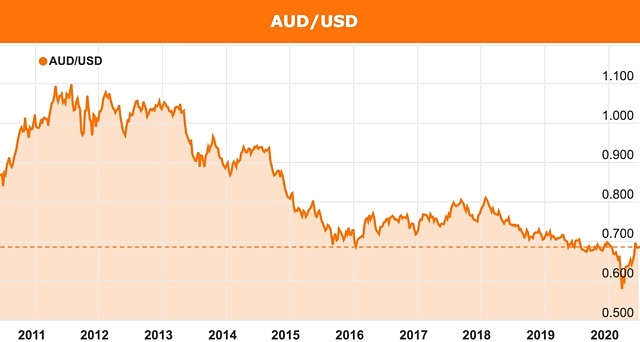Reserve Bank of Australia governor shares the good economic news – and the bad

According to the RBA’s governor Dr Philip Lowe, interest rates will likely remain at current levels for years to come.
Reserve Bank Governor Dr Philip Lowe has put out a report card on the Australian economy and it is a decidedly mixed bag.
On the plus side, he is relieved that the economic damage so far from the COVID-19 pandemic is not as bad as he initially feared.
On the minus side, he is preparing Australia for many years of the current low interest rates, which indicates there is no magic boom visible on the far horizon.
Pandemic will weigh on the economy for many years
Addressing a virtual conference held by the Australian National University’s Crawford School, Dr Lowe said the pandemic had changed the mentality of consumers and would weigh on businesses and governments as they sought to recover.
Dr Lowe said record low interest rates will remain in place for years, with the coronavirus pandemic set to cast an enduring shadow over the Australian economy.
“I think it’s likely we’re going to see interest rates at their current level for years,” Dr Lowe said.
“We do face a world where there’ll be a shadow from the virus for quite a few years. People will be more risk-averse, they won’t want to borrow, in Australia we’re going to have lower population dynamics.”
Australia must embrace reform
Dr Lowe was insistent that Australia needed to embrace a reform agenda to get the economy out of its current funk, with the federal government’s focus on infrastructure, industrial relations and regulation welcome.
He also called for reform in other areas including tax, human capital, regulation and research and development.
“If we don’t address those areas then I’ll think we’ll just meander along with mediocre growth, and we can’t borrow our way out of that,” he said.
He also signalled that the RBA could embrace some reforms of its own, with the three-decade old system of targeting inflation up for debate in a “few years’ after the coronavirus crisis has passed.
Inflation targeting system could change
Dr Lowe said the existing monetary policy framework, including the 2-3 per cent inflation target, had served Australia well and should not be changed too quickly.
“I don’t think it’s the right time now to change the monetary policy framework,” he said.
“The one we’ve had for 30 years has served us very well.
“But as things develop over the next few years it might be worth looking at it again.”
That marks a considerable shift from Dr Lowe’s explicit backing of the inflation targeting framework that was renewed with Treasurer Josh Frydenberg last November.
Lower dollar would be helpful
Unsurprisingly, Dr Lowe also revealed he would like the Australian dollar to ease from its current much higher levels, saying this would help the economy.
“I’d like a lower one; I’d like lower unemployment and slightly higher inflation,” he said, while acknowledging that may take a while.
“At the moment it’s hard to argue that the Australian dollar is overvalued,” he said.

“At some point, it’s true that could be a problem but I don’t think we’ve reached that point yet.”
Economy performing better than expected
However, Dr Lowe said he was happy that the Australian economy was performing better than he had expected.
Earlier this year he predicted that hours worked would collapse by 20% as unemployment climbed, but he now believes the drop could be 10%.
The RBA has been very active during the COVID-19 pandemic, taking official interest rates to a record low of 0.25%, buying more than $50 billion in state government bonds and extending a $90 billion line of credit to commercial banks to lend to small and medium-sized businesses.
That occurred as the federal government pushed official gross debt to a record $680.4 billion as it copes with a collapse in tax revenue and ramps up extra spending to help support the economy.
Australia has reasons for optimism
“I’ve been encouraged recently that the government has moved in a number of areas, it’s talked about industrial relations, it’s talked about infrastructure and it’s talked about the need to reduce regulation,” Dr Lowe said.
“I fear if we don’t leverage the advances in technology and we don’t see policy reform we’ll just go on and meander, and kind of have slow growth and slow growth in incomes.”
Dr Lowe said the way the government has responded to the health crisis in the recent months shows there’s a capacity for it to make economic reform.
“Australia has done remarkably well over the past few months compared to other countries, both on the health front, the political cohesion and the economic front,” he said
“That should give us more confidence that we’ll meet the economic challenges as well.”
